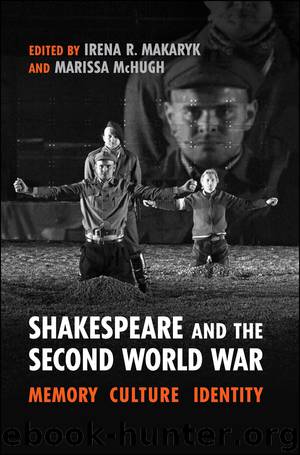Shakespeare and the Second World War by Irena Makaryk

Author:Irena Makaryk [Makaryk, Irena R. and McHugh, Marissa]
Language: eng
Format: epub
Tags: DRA010000, LIT011000, PER011020
Publisher: University of Toronto Press
Published: 2012-03-03T16:00:00+00:00
8.2. Photographs of Japanese products with English names or words: ‘Are these Japanese products made for Japanese people?’ The Photographic Weekly Bulletin 257 (3 February 1943), 5–6.
As if in response, on 3 February 1943 the Shashin Shûhô [The Photographic Weekly Bulletin], which was published by the Cabinet’s Information Board in order to provide extensive publicity for national policy in a straightforward and accessible manner, bitterly criticized Japanese products with English names and words (7–8; see fig. 8.2); the preceding pages of the same issue decried the use of English words in signboards. The hostility expressed toward the United States and Britain may also be seen in the Great East Asia Society of Literature, founded in 1942; the main theme at the annual conferences of the Society (held for three consecutive years, 1942 to 1944) was either critical reevaluation (that is, devaluation) or annihilation of American and British culture.7
In spite of or because of such difficult circumstances, the Japanese elite and intellectuals continued to make an exception for Shakespeare. In an article in the Asahi on 8 January 1941, Shakespeare plays, including Romeo and Juliet, are found on the list of recommended books for teenage girls, along with Tolstoy’s works and Greek myths (‘Naniwo Yomuka’ 4). How could it be that Shakespeare continued to be both desired and denounced?
There are at least two notable characteristics of the discourses on the nationalist appropriation of Shakespeare in wartime Japan: one is the frequent reference made to Thomas Carlyle’s On Heroes, Hero-worship, and the Heroic in History (1841) as a way of disqualifying Britain as the sole possessor of Shakespeare; the other is a marked tendency to identify Shakespeare as part of German culture. When Yamato concluded his slogan with ‘He is ours as well,’ he knew that his readers would immediately understand his implicit reference to Carlyle’s famous passage and to the British colonies in Asia.
Carlyle’s On Heroes was one of the most popular books among Japanese students in higher education. The first Japanese translation was published in 1898, and at least three other versions were published and re-printed during the next thirty years (1912, 1914, 1922, 1923, and 1933). The majority of the elite and intellectuals of the 1930s had read Carlyle either in English or in Japanese, and were familiar with the following passage:
For our honour among foreign nations, as an ornament to our English Household, what item is there that we would not surrender rather than him? Consider now, if they asked us, Will you give up your Indian Empire or your Shakespeare, you English; never have had any Indian Empire, or never have had any Shakespeare? Really it were a grave question. Official persons would answer doubtless in official language; but we, for our part too, should not we be forced to answer: Indian Empire, or no Indian Empire; we cannot do without Shakespeare! Indian Empire will go, at any rate, some day; but this Shakespeare does not go, he lasts forever with us; we cannot give up –
Download
This site does not store any files on its server. We only index and link to content provided by other sites. Please contact the content providers to delete copyright contents if any and email us, we'll remove relevant links or contents immediately.
| Ancient & Classical | Arthurian Romance |
| Beat Generation | Feminist |
| Gothic & Romantic | LGBT |
| Medieval | Modern |
| Modernism | Postmodernism |
| Renaissance | Shakespeare |
| Surrealism | Victorian |
4 3 2 1: A Novel by Paul Auster(12360)
The handmaid's tale by Margaret Atwood(7744)
Giovanni's Room by James Baldwin(7313)
Asking the Right Questions: A Guide to Critical Thinking by M. Neil Browne & Stuart M. Keeley(5747)
Big Magic: Creative Living Beyond Fear by Elizabeth Gilbert(5738)
Ego Is the Enemy by Ryan Holiday(5406)
The Body: A Guide for Occupants by Bill Bryson(5067)
On Writing A Memoir of the Craft by Stephen King(4924)
Ken Follett - World without end by Ken Follett(4713)
Adulting by Kelly Williams Brown(4560)
Bluets by Maggie Nelson(4541)
Eat That Frog! by Brian Tracy(4508)
Guilty Pleasures by Laurell K Hamilton(4433)
The Poetry of Pablo Neruda by Pablo Neruda(4084)
Alive: The Story of the Andes Survivors by Piers Paul Read(4013)
White Noise - A Novel by Don DeLillo(3999)
Fingerprints of the Gods by Graham Hancock(3982)
The Book of Joy by Dalai Lama(3965)
The Bookshop by Penelope Fitzgerald(3838)
